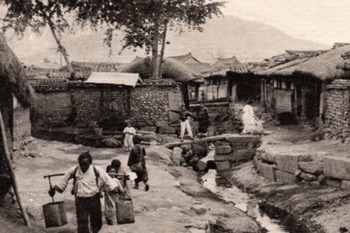When The Night Belonged To The Blind
 One hundred and 40 years ago a stroll down the streets of Seoul (South Korea) would have been a surreal experience. You would rarely see a woman walking the streets most of the day. However, you may run into the fairer sex at night because men, with very few exceptions, were confined to their homes during a curfew hour.
One hundred and 40 years ago a stroll down the streets of Seoul (South Korea) would have been a surreal experience. You would rarely see a woman walking the streets most of the day. However, you may run into the fairer sex at night because men, with very few exceptions, were confined to their homes during a curfew hour.“There were designated times during the evening when women were permitted to leave their homes. Louise Miln reported in the nineteenth century that “after the curfew rings, it is illegal for a Korean man to leave his own house; then it becomes legal for Korean women to slip out and take the air and gossip freely.” Henry Savage-Landor also noted those times when women could leave their domestic sphere for an outside realm of female sociability: “Men are confined to the house from about an hour after sunset or were severely punished both with imprisonment and flogging if found walking about the streets during ‘women’s hours.’
One exception to curfew hours for men during the ChosQn dynasty (1392–1910) applied to blind men. Percival Lowell, an American residing in Seoul during the winter of 1883/84 was one of the exceptions and vividly described his jaunts through Seoul's darkened streets. He also described some of the other exceptions:
"There is another class in the community who are permitted freely to roam at nights, ― blind men. A thoughtful kindness has given them an immunity they could never abuse. Unable to travel fast they can easily be watched; and so blind men's holiday in Korea is prolonged from the twilight on till dawn."
Please reach out to SDCB to learn more about our vision rehabilitation programs and services,
“Curfew allows nighttime to belong to the blind”



